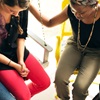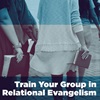Anyone who has been in a relationship of any kind for more than two weeks will tell you relationships are messy. The same is true for community—perhaps even more so. See, a community isn't just one relationship, but a web of interwoven relationships. So if one relationship can be messy to maintain, just imagine the mess a community can be!
In Genesis, the Bible records the moment often referred to as the Fall. In Genesis 2, God tells Adam not to eat of the tree of the knowledge of good and evil. Just one chapter later, Eve decides to disobey God and eats the fruit and gives it to Adam to eat. What happened in that moment altered the world forever. Sin—choosing self over God—entered the world and separated man from a sinless God, and the curse of sin followed.
God said humans would no longer have a peaceful life but a hard life. Work would be tough, childbearing would be painful, and our lives would now end in death. In Romans 5:12, Paul gives us a divinely inspired explanation of the significance of this event: "Therefore, just as sin entered the world through one man, and death through sin, and in this way death came to all people, because all sinned."
Basically, in this moment the world was broken. Sin created a permanent scar on creation which spread to every person born. Now the world isn't as it should be. And the reality of sin impacts small-group life by making relationships more complicated. Keep these principles in mind to help your group be a transformative place in the midst of messy relationships.
1. Have realistic expectations for group life. I can't tell you how many times I've talked with group leaders or members who have communicated frustration because their group isn't everything they hoped it would be. They haven't had amazing life-altering BFF (best friends forever) meetings each week.
Here's the skinny from the small-group guy himself: Vision can kill a small group. I cast vision all day long, but small groups aren't a dream world; they're real people living real life together. God designed people with different quirks, habits, and personalities. So no, you probably will not like everyone in your group at first. Truthfully, you may ask, "How did I wind up in this room with these people?" Here is my plea to you: Be real with yourself. First of all, you are nowhere near as cool as you think you are—you have your own quirks, too. Secondly, community takes time and intentionality to build. I tell leaders to tell any prospective group members to give the group at least six weeks to see if it's a good fit. Leaders, don't promise the moon; members, don't expect it.
2. Remember that we're all sinners. As a group leader of a messy community, you must remember and communicate this. Pride would have us always focus our attention on the sin of others and not on our own sin. The gospel reverses that, reminding us that it was me who sinned first and worst by rejecting God himself. But in response to my sin, God chose to love me, pursue me, forgive me, and even adopt me as his child. The only way you breakthrough to life-altering community is by putting this principle into practice often. Nothing will save you more headaches and frustration than remembering what Paul says in Romans 5.12: Death spread to all men. Why? Because all sinned. Remember, Christ's death paid the penalty for our sin. So God now sees us through Christ's sinless nature. Having a relationship with Christ doesn't mean we are able to stop sinning for the rest of our lives. While the spirit of God gives us a stronger distaste for sin the more we grow with him, until we are with Jesus face to face, we are sinners saved by grace.
3. Everyone has a story. As a group leader, I tend to peg people into stereotypes pretty quickly. There's angry guy, crybaby, jokester, Johnny-talks-a-lot, and silent Sam. This may seem helpful so that you can better prepare for and facilitate your group meetings. But when you get beneath the surface and spend time with group members, you will quickly see that a lot of what makes a person who they are comes from their past experiences. So instead of labeling people, especially early on, take the time to get to know one another. One of the best exercises I've seen to this end is "life mapping." This is when a group takes a weekend away, and over the course of the weekend, group members share a 30-minute version of their story of coming to faith. Other groups may take time to share one story a week during regular meetings. Whatever you do, remember everyone has a story, so give your group members grace as you build community with them.
—Spence Shelton is the Small Groups Pastor at Summit Church in Durham, North Carolina.
This article is adapted from his blog, and is part of his series "A Theology of Community." Used with permission from the author.










